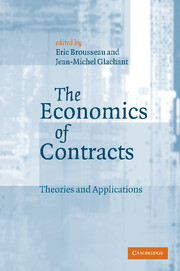Book contents
- Frontmatter
- Contents
- List of figures
- List of tables
- List of contributors
- Acknowledgments
- Part I Introduction
- 1 The economics of contracts and the renewal of economics
- Part II Contracts, organizations, and institutions
- Part III Law and economics
- Part IV Theoretical developments: where do we stand?
- Part V Testing contract theories
- Part VI Applied issues: contributions to industrial organization
- Part VII Policy issues: anti-trust and regulation of public utilities
- Bibliography
- Index of names
- Subject index
1 - The economics of contracts and the renewal of economics
Published online by Cambridge University Press: 16 January 2010
- Frontmatter
- Contents
- List of figures
- List of tables
- List of contributors
- Acknowledgments
- Part I Introduction
- 1 The economics of contracts and the renewal of economics
- Part II Contracts, organizations, and institutions
- Part III Law and economics
- Part IV Theoretical developments: where do we stand?
- Part V Testing contract theories
- Part VI Applied issues: contributions to industrial organization
- Part VII Policy issues: anti-trust and regulation of public utilities
- Bibliography
- Index of names
- Subject index
Summary
Introduction
To an economist, a contract is an agreement under which two parties make reciprocal commitments in terms of their behavior – a bilateral coordination arrangement. Of course, this formulation touches on the legal concept of the contract (a meeting of minds creating effects in law), but also transcends it. Over the course of the past thirty years, the “contract” has become a central notion in economic analysis (section 2), giving rise to three principal fields of study: “incentives,” “incomplete contracts,” and “transaction costs” (section 3). This opened the door to a revitalization of our understanding of the operation of market economies … and of the practitioner's “toolbox” (section 4).
The goal of this chapter is to provide an overview of recent developments in these analytical currents, to present their various aspects (section 5), and to propose expanding horizons (section 6). The potential of these approaches, which have fundamentally impacted on many areas of economic analysis in recent decades, is far from exhausted. This is evinced by the contributions in this book, which draw on a variety of methodological camps and disciplines.
The central role of the notion of the contract in economic analysis
Even though the notion of the contract has long been central to our understanding of the operation of decentralized social systems, especially in the tradition of the philosophie des lumiéres, only recently have economists begun to render it justice. Following in the footsteps of Smith and Walras, they long based their analyses of the functioning of decentralized economies on the notions of market and price system.
- Type
- Chapter
- Information
- The Economics of ContractsTheories and Applications, pp. 3 - 42Publisher: Cambridge University PressPrint publication year: 2002
- 19
- Cited by

